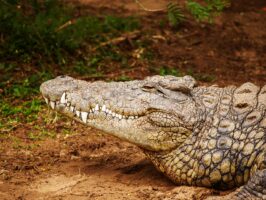Two weeks ago, residents of Port Aransas began to notice the absence of a familiar face at the Leonabelle Turnbull Birding Center: Boots, the 12-foot American Alligator who had become a beloved fixture. Boots, known for his impressive size and often seen basking in the sun, had seemingly disappeared from his usual spot, sparking curiosity and concern among the locals.
Boots on the Move
After his initial disappearance, vigilant residents spotted Boots in a drainage canal about a mile away from the birding center. This shift in location raised questions about his safety and well-being. As the community adjusted to his new whereabouts, the Port Aransas Nature Preserve reported yet another change in Boots’ location.
“Alligators can learn behaviors pretty quickly,” said the Port Aransas Nature Preserve manager, Rae Mooney. She noted that external factors, such as people feeding Boots, might influence his movements, something the preserve wants to discourage. “We want him to move on his own,” Mooney emphasized, highlighting that Boots had recently been seen in a more favorable location, a wide-open area in the wetlands, far from human interference.
The Community’s Concern
Port Aransas residents remain concerned about their safety and Boots’ well-being, even as the Nature Preserve focuses on his autonomy. “Right now, so many of us love Boots, and we just want to know where he is,” said Neesey Tompkins, a resident who, like many others, has grown fond of the alligator.
Mooney reassured the public that Boots was not a threat to the community and that his movements were natural for a wild animal. “We don’t know where he is all the time. We don’t have him trapped in any way at the birding center; he likes it there, partly because there’s a lot of fresh water,” she explained. Mooney also mentioned that Boots is expected to return to the birding center on his terms, alleviating some concerns about his well-being.
A Call for Responsibility
Despite these reassurances, some residents remain uneasy. The fear that Boots might not make it back to the birding center, especially if the water sources in his current location dry up, lingers in the minds of those who have come to care for him. “What if everything does dry up and he can’t make it back? And I know the city is telling us that he’s gonna make it back, but is that a hundred percent sure?” Tompkins questioned, voicing the uncertainty felt by many.
In response to these concerns, Mooney stressed the importance of leaving Boots to his natural behavior. “That is why we’re encouraging people to leave him alone and let him move out on his own. He moved over there on his own for a reason,” she said, emphasizing that human interference could do more harm than good.
The Nature Preserve has been spreading the word through social media, newsletters, and word of mouth, urging residents not to feed Boots or other alligators. In Texas, feeding alligators is illegal unless it is during hunting season, which is not currently the case in Port Aransas. Mooney reiterated that they are doing everything possible to avoid relocating Boots, which is unnecessary.
As Boots continues to navigate the wetlands of Port Aransas, the community watches closely, hoping for his safe return to the birding center and trusting in the expertise of the Nature Preserve to guide his journey.

